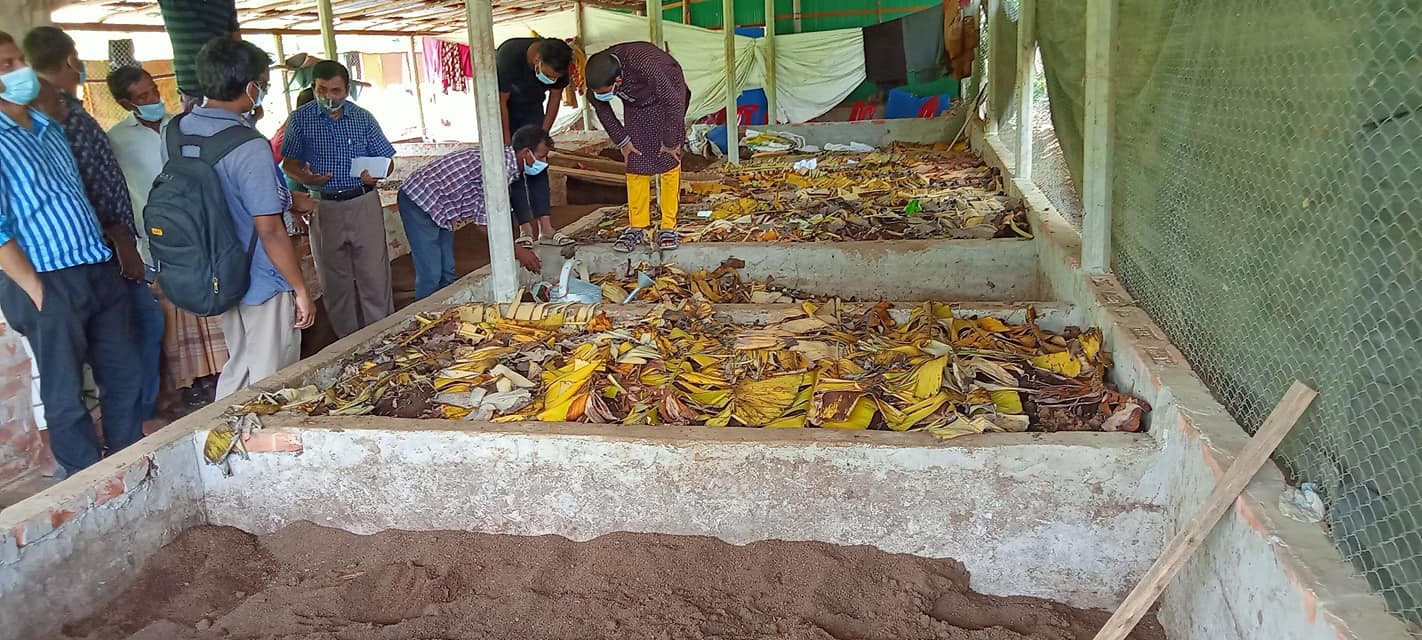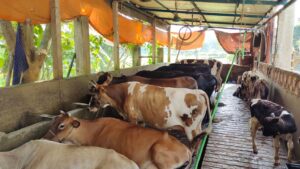Vermicomposting has started gaining popularity in the region including its vast Barind tract as many farmers are showing interest towards setting up vermi-compost hatchery and farms due to its lucrative outputs, reports BSS.
Raihan Kabir, a farmer of Kharibona village under Nachole upazila, has set instance of becoming self-reliant through vermicomposting farm in his dwelling house. Raihan started his venture with 2,000 earthworms in five earthen pots in 2017. So far, he has sold 2,100 kilograms of vermicompost worth around Taka 27,300 to the local farmers. Other 600 kilograms remains stockpiled for selling. In last one year, he has enhanced the number of earthen pots to 63 from the initial stage of only five.
Jahangir Alam, 35, of Shinghamara village under Mohanpur upazila in the district has become almost self-reliant through manufacturing vermi-compost. With his wife Sahar Banu’s close collaboration, he established a household factory for manufacturing organic fertilizer.
Vermi-compost fertilizer, one kind of organic fertilizer made from earthworm, has started becoming popular in the region. Jahangir Alam couple is now ideal figure in their village as they spread the light of knowledge of becoming self-reliant by teaching the production methods of vermi-compost fertilizer to put an end to their hardship.
He said only earthworm and cow-dung are used in producing vermi-compost fertilizer which helps to protect environment, fertility of the land, increase resistance power of crops against diseases and escalate crops production.
They have a plan to give training free of cost to 10 women in each of the villages under their upazila and help them to set up firms for producing vermi-compost fertilizer. The couple urged the government to give them financial support to expand their firms as they have planned to produce 400 maunds vermicompost fertilizer per day.
The knowledge of vermi-composting started brighter life for Shah Alam and his wife Momtaz of Mohishkundi village under the same upazila ending their dark times of miseries, hunger and uncertainty.“Our bad days are over after starting the production and selling of vermi-compost fertilizer in our neighborhood and becoming financially solvent. We are now happy,” Alam said while talking to BSS.
Alam couple started their venture investing Taka 55,000 only. Later, Alam took Taka five lakh loan from Rajshahi Krishi Unnayan Bank (RAKUB) for expansion of his business. Now, four employees are working full time in their firms while there are also some temporary staff. Each of the permanent employees gets Taka 6,000 per month as salary.
Alam hopes to produce four-maund of vermicompost fertilizer in a day after one month and the production of earthworm, one of the two components of producing vermicompost fertilizer, will be increased by manifolds within few weeks.
Many farmers of the village including Ashraf Ali, Jabed Ali and Nazrul Islam were seen saying quality of locally manufactured vermicompost is better than many other organic fertilizers being sold in markets. Upazila Agriculture Officer Dr Bimol Kumar Pramanik said vermicompost has brought a remarkable change in agriculture sector. Around 10 vermicomposting farms were established in Durgapur upazila. Each of those has 250 pots with 15 kilograms of cowdung and 200 grams earthworm.
Upazila Agriculture Office imparted training to the members of Integrated Crop Management and Integrated Pest Management for making them encouraged and interested towards vermicomposting. Muhammad Ali, a farmer of Gulalpara village under the same upazila, said vermicompost is very much important for betel leaf farming besides making it disease-free.
“I have been using the organic fertilizer instead of chemical fertilizer for the last five to six years,” said Ali adding that many of his fellow-farmers are being interested to use the organic manure like him.
SM Mustafizur Rahman, Additional Director of Department of Agriculture Extension (DAE), said vermicompost fertiliser is being used to regain the fertility of land which was drastically lost due to excessive use of chemical fertiliser.
Many farmers have started manufacturing this organic fertilizer after taking training from the DAE.




